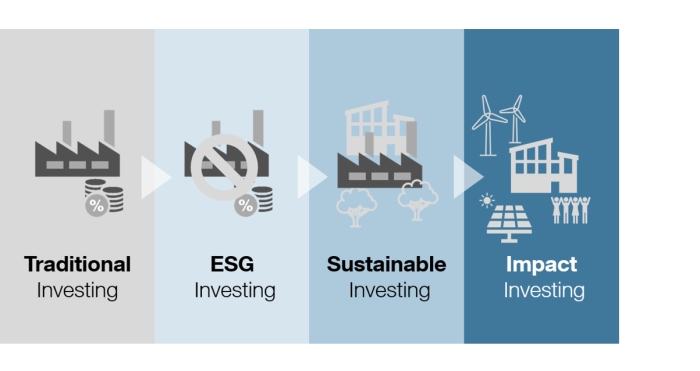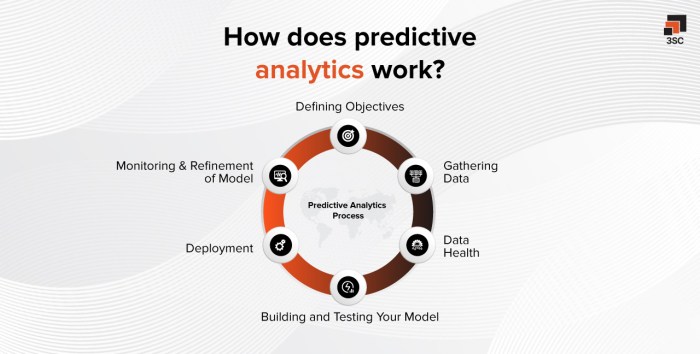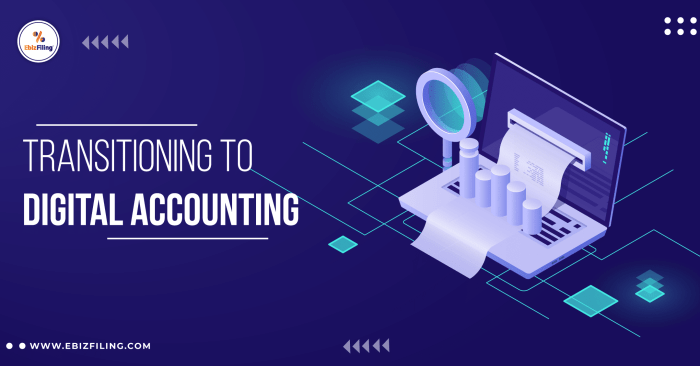The Future of Accounting in a Borderless Digital Economy is rapidly evolving, driven by technological advancements and globalization. This transformation presents both challenges and unprecedented opportunities for accounting professionals. The integration of artificial intelligence, blockchain, and cloud computing is reshaping traditional accounting practices, demanding a new skillset and a proactive approach to adaptation. This exploration delves into the key aspects of this evolution, examining the impact of technological disruption, the rise of data analytics, and the need for global standardization and regulation.
From automating mundane tasks to leveraging data analytics for insightful financial forecasting, the role of the accountant is becoming increasingly strategic and complex. The ability to navigate cybersecurity risks, understand evolving regulations, and embrace continuous professional development are crucial for success in this dynamic landscape. This analysis will examine the evolving skillset needed, the emergence of new roles, and the strategies for accountants to thrive in this borderless digital environment.
Technological Disruption in Accounting
The accounting profession is undergoing a period of significant transformation driven by rapid technological advancements. Automation, artificial intelligence (AI), blockchain, and cloud computing are reshaping traditional accounting practices, creating both challenges and opportunities for accountants. This shift demands adaptability and a willingness to embrace new technologies to remain competitive and relevant in the modern business landscape.
Automation and AI’s Impact on Traditional Accounting Practices
Automation and AI are significantly impacting traditional accounting practices by streamlining routine tasks and improving accuracy. Tasks such as data entry, reconciliation, and basic bookkeeping are increasingly automated, freeing up accountants to focus on higher-value activities like financial analysis, strategic planning, and client advisory services. AI-powered tools can also detect anomalies and potential fraud more effectively than manual processes, enhancing the overall efficiency and reliability of financial reporting. For example, robotic process automation (RPA) can automate invoice processing, reducing errors and speeding up payment cycles. AI algorithms can analyze vast datasets to identify trends and patterns that might indicate financial irregularities, providing early warnings of potential problems. This shift towards automation necessitates a workforce skilled in managing and interpreting the output of these technological tools.
Blockchain Technology’s Role in Enhancing Transparency and Security
Blockchain technology offers the potential to revolutionize financial transactions by enhancing transparency and security. Its decentralized and immutable nature ensures that all transactions are recorded securely and transparently, making it difficult to alter or manipulate data. This is particularly relevant for accounting, where maintaining accurate and reliable records is paramount. For instance, blockchain can be used to track the entire lifecycle of an asset, from its origin to its final sale, providing a clear audit trail and reducing the risk of fraud. The use of smart contracts, self-executing contracts with the terms of the agreement directly written into code, further automates and streamlines financial processes, reducing the need for manual intervention and minimizing errors. This enhanced transparency and security can lead to increased trust and efficiency in cross-border transactions.
Cloud Computing’s Transformation of Data Storage and Accessibility
Cloud computing is transforming how accountants store, access, and manage data. Cloud-based accounting software provides real-time access to financial information from anywhere with an internet connection, improving collaboration and efficiency. This accessibility is particularly beneficial for businesses operating across multiple geographical locations or with remote teams. Cloud solutions also offer scalability and flexibility, allowing businesses to easily adjust their storage capacity as their needs change. Furthermore, cloud providers often incorporate robust security measures to protect sensitive financial data, reducing the risk of data breaches and ensuring compliance with data privacy regulations. The shift to cloud-based systems allows for greater data integration and analytics capabilities, providing accountants with more comprehensive insights into a company’s financial performance.
Emerging Technologies Reshaping the Accounting Profession
Several emerging technologies are reshaping the accounting profession, including advanced analytics, machine learning, and natural language processing (NLP). Advanced analytics techniques, such as predictive modeling, allow accountants to forecast financial performance and identify potential risks more accurately. Machine learning algorithms can automate complex tasks, such as tax planning and financial forecasting, while NLP can automate tasks like document review and data extraction. The integration of these technologies is creating new opportunities for accountants to provide more sophisticated and value-added services to their clients. For instance, predictive analytics can help businesses optimize their cash flow, while machine learning can assist in identifying potential tax savings.
Comparison of Traditional and Modern Digital Accounting Methods
| Method | Traditional Approach | Digital Approach | Advantages of Digital Approach |
|---|---|---|---|
| Data Entry | Manual data entry into spreadsheets or accounting software | Automated data entry through optical character recognition (OCR) and AI | Increased speed, accuracy, and efficiency; reduced human error |
| Financial Reporting | Manual compilation of financial statements | Automated generation of reports using accounting software and data analytics | Faster report generation, improved accuracy, enhanced data visualization and analysis |
| Auditing | Manual review of documents and records | Automated data analysis and anomaly detection using AI and machine learning | More efficient audit processes, improved detection of fraud and errors, reduced audit costs |
| Tax Compliance | Manual calculation and filing of tax returns | Automated tax calculation and e-filing using tax software and AI-powered tools | Reduced errors, faster filing, improved compliance |
The Rise of Data Analytics in Accounting
The accounting profession is undergoing a significant transformation, driven by the increasing availability of data and the advancements in analytical technologies. No longer is accounting solely about recording and reporting financial transactions; it’s evolving into a data-driven discipline where insights gleaned from vast datasets inform strategic decision-making and risk management. The integration of data analytics is paramount to navigating the complexities of a borderless digital economy.
Data analytics empowers accountants to move beyond simply processing numbers to identifying trends, patterns, and anomalies within financial data. This capability allows for proactive risk mitigation, improved forecasting accuracy, and more informed business strategies. The ability to extract meaningful insights from large datasets is no longer a luxury but a necessity for accountants to remain competitive and relevant in today’s dynamic business environment.
Skills Required for Data Analytics in Accounting
Effective utilization of data analytics tools requires a blend of technical and soft skills. Accountants need a strong foundation in accounting principles and financial reporting, coupled with proficiency in statistical analysis, data visualization, and programming languages like Python or R. Furthermore, critical thinking, problem-solving abilities, and the capacity to communicate complex data insights to non-technical audiences are essential for translating analytical findings into actionable strategies. Understanding data mining techniques, database management, and the ethical implications of data analysis are also becoming increasingly important.
Workflow for Improving Financial Forecasting and Decision-Making with Data Analytics
A typical workflow begins with data collection and cleaning, ensuring data accuracy and consistency. This is followed by exploratory data analysis (EDA) to identify patterns and potential outliers. Then, appropriate analytical models, such as regression analysis or time series forecasting, are selected and applied to the data. The results are then visualized using dashboards or reports, facilitating clear communication of insights to stakeholders. Finally, these insights inform strategic decision-making, potentially leading to adjustments in budgets, resource allocation, or business strategies. For example, analyzing historical sales data coupled with external economic indicators can significantly improve sales forecasting accuracy.
Applying Data Analytics to Detect Fraud and Prevent Financial Irregularities
Data analytics plays a crucial role in fraud detection by identifying anomalies and inconsistencies in financial data that might indicate fraudulent activities. Techniques such as anomaly detection algorithms can identify unusual transactions or patterns that deviate significantly from established norms. For instance, analyzing purchasing patterns for unusually large or frequent orders from a single vendor might highlight a potential procurement fraud scheme. Predictive modeling can also be employed to assess the risk of fraud based on various factors, allowing for proactive preventative measures.
Top 5 Data Analytics Tools Used in Modern Accounting
The landscape of data analytics tools is constantly evolving, but several stand out as particularly useful for accountants.
- Microsoft Excel: While not strictly a data analytics tool, Excel’s robust spreadsheet capabilities and built-in functions remain a cornerstone for basic data analysis and visualization in accounting.
- Tableau: This leading business intelligence platform offers powerful data visualization tools, enabling accountants to create interactive dashboards and reports to effectively communicate complex financial data.
- Power BI: Microsoft’s Power BI provides a comprehensive suite of data analysis and visualization tools, seamlessly integrating with other Microsoft products and offering strong data connectivity options.
- Qlik Sense: Known for its user-friendly interface and powerful data discovery capabilities, Qlik Sense allows accountants to easily explore and analyze large datasets, identifying key insights and trends.
- R and Python: These programming languages, along with their associated libraries, provide highly flexible and powerful tools for advanced statistical analysis, predictive modeling, and machine learning applications within accounting.
Global Standardization and Regulation in Accounting

The increasing interconnectedness of the global economy necessitates a harmonized approach to accounting practices. Inconsistencies in accounting standards across nations create challenges for multinational corporations, investors, and regulators alike. The pursuit of global standardization aims to enhance transparency, comparability, and trust in financial reporting, ultimately fostering a more stable and efficient international marketplace.
The diverse landscape of accounting standards across countries and regions presents significant complexities. While some nations adhere closely to International Financial Reporting Standards (IFRS), others maintain their own unique Generally Accepted Accounting Principles (GAAP). These differences can range from minor variations in terminology to substantial discrepancies in the treatment of specific transactions, such as revenue recognition, inventory valuation, and the capitalization of assets. For instance, US GAAP and IFRS often differ in their approaches to lease accounting, leading to variations in reported financial statements for companies operating under both sets of rules. This lack of uniformity makes cross-border comparisons difficult and potentially misleading for stakeholders.
Challenges in Enforcing Consistent Accounting Practices
Enforcing consistent accounting practices globally presents numerous challenges. Differences in legal frameworks, enforcement mechanisms, and levels of regulatory oversight across countries contribute to inconsistencies. Furthermore, the sheer volume of transactions occurring across borders, coupled with the complexity of modern business structures, makes monitoring and auditing a significant undertaking. The lack of a universally accepted enforcement body adds to the difficulty of ensuring compliance. Enforcement often relies on a combination of national regulatory bodies and the self-regulatory efforts of professional accounting organizations, which can vary significantly in their effectiveness and reach. Cases of accounting fraud across borders highlight the need for stronger international cooperation and more robust regulatory frameworks.
The Role of International Accounting Bodies, The Future of Accounting in a Borderless Digital Economy
International accounting bodies, most notably the International Accounting Standards Board (IASB), play a crucial role in setting global standards. The IASB develops and promotes the adoption of IFRS, aiming to create a single set of high-quality, globally accepted accounting standards. While IFRS adoption is not mandatory in all countries, its influence is widespread, and many nations have either adopted IFRS fully or partially converged their national GAAP with IFRS. However, the IASB’s effectiveness depends on the willingness of individual nations to adopt and enforce IFRS, which can be influenced by political, economic, and cultural factors. The IASB’s ongoing efforts to improve and update IFRS demonstrate a commitment to addressing evolving business practices and technological advancements.
Impact of Evolving Regulations on the Future of Accounting Practices
Evolving regulations, driven by factors such as technological advancements, globalization, and increased investor scrutiny, are reshaping the future of accounting practices. The rise of data analytics and artificial intelligence, for example, is transforming auditing and financial reporting processes, leading to the development of new auditing techniques and the need for accountants with specialized skills in data analysis. Increased regulatory scrutiny in areas such as environmental, social, and governance (ESG) reporting is also creating new demands for accountants to demonstrate their expertise in sustainability and corporate responsibility. The implementation of new regulations related to cryptocurrency and blockchain technology will further challenge accounting professionals to adapt their knowledge and skills. The need for continuous professional development and upskilling will be paramount for accountants to remain relevant in this rapidly changing environment.
Key Considerations for Accountants Operating in a Multinational Context
Accountants operating in a multinational context must consider several key factors:
- Understanding and applying the relevant accounting standards in each jurisdiction where the company operates.
- Navigating the complexities of different tax systems and regulations.
- Ensuring compliance with local laws and regulations regarding financial reporting and disclosure.
- Managing currency exchange rate fluctuations and their impact on financial statements.
- Developing effective internal controls and risk management processes to mitigate cross-border risks.
- Building strong relationships with local regulatory authorities and professional accounting bodies.
- Staying updated on changes in international accounting standards and regulations.
- Utilizing technology to streamline cross-border accounting processes and enhance efficiency.
The Changing Role of the Accountant
The digital revolution is fundamentally reshaping the accounting profession. No longer is the accountant solely a number cruncher; the role is evolving into a strategic business partner leveraging technology and data to drive informed decision-making. This transformation demands a new skill set, a proactive approach to professional development, and a willingness to embrace innovative technologies.
The evolving skill set needed for accountants in the digital age extends far beyond traditional bookkeeping. While a strong foundation in accounting principles remains crucial, proficiency in data analytics, cloud computing, cybersecurity, and automation tools is now essential. Accountants must be comfortable working with large datasets, interpreting complex financial models, and using software such as ERP systems and specialized accounting platforms. Furthermore, understanding blockchain technology and its implications for financial reporting is becoming increasingly important.
Evolving Skill Sets for Accountants
Accountants must develop a multifaceted skillset encompassing both technical and soft skills. Technical skills include expertise in accounting software, data analytics tools (like SQL and Python), and cloud-based platforms. Soft skills, such as communication, problem-solving, and critical thinking, are equally crucial for effectively interpreting data and advising clients. For instance, an accountant might need to explain complex financial information to a non-finance manager, requiring clear and concise communication skills. Similarly, analyzing financial discrepancies requires strong problem-solving abilities.
The Importance of Communication and Interpersonal Skills
Strong communication and interpersonal skills are paramount for modern accountants. The ability to effectively communicate complex financial information to diverse audiences – from senior management to non-financial stakeholders – is critical for building trust and influencing decisions. This includes both written and verbal communication, presentation skills, and the ability to actively listen and understand the needs of clients and colleagues. For example, an accountant presenting a financial analysis to a board of directors must be able to clearly articulate key findings, answer questions confidently, and adapt their communication style to suit the audience.
Emerging Roles and Responsibilities for Accountants
The expanding role of the accountant includes responsibilities beyond traditional tasks. Accountants are increasingly involved in strategic planning, risk management, and compliance. They are expected to provide insightful analysis, identify opportunities for improvement, and proactively mitigate risks. New roles such as data analysts, cybersecurity specialists, and blockchain experts are emerging within accounting firms and organizations. For example, a firm might employ a dedicated data analyst to leverage large datasets to identify fraud patterns or optimize financial processes.
Continuous Professional Development
Continuous professional development (CPD) is no longer optional; it’s a necessity for accountants to stay relevant. The rapid pace of technological advancements and regulatory changes demands ongoing learning. Accountants must actively participate in training programs, workshops, and online courses to enhance their technical skills, stay abreast of industry best practices, and maintain their professional certifications. Examples of relevant CPD activities include attending conferences on data analytics in accounting, completing online courses on cybersecurity best practices, or obtaining certifications in specific accounting software.
Strategies for Adapting to Change
Accountants can proactively adapt by embracing lifelong learning, actively seeking out new opportunities, and networking with colleagues and industry experts. This involves staying informed about emerging technologies, attending industry events, and engaging in online communities. For example, participating in online forums and discussions can provide valuable insights into new trends and technologies. Furthermore, seeking mentorship from experienced professionals can offer guidance and support in navigating the changing landscape. Proactive engagement with technology, continuous learning, and a focus on building strong interpersonal skills will enable accountants to thrive in the evolving digital environment.
Cybersecurity and Data Privacy in Accounting: The Future Of Accounting In A Borderless Digital Economy

The digital transformation of accounting has brought unprecedented efficiency and opportunities, but it has also significantly increased the vulnerability of accounting firms and their clients to cybersecurity threats. The sensitive nature of financial data makes the accounting profession a prime target for cybercriminals seeking financial gain or to cause disruption. Robust cybersecurity measures are no longer a luxury but a necessity for survival in the modern accounting landscape.
The increasing reliance on cloud-based systems, interconnected networks, and the proliferation of mobile devices expands the attack surface, creating a complex web of potential security breaches. Data breaches can lead to significant financial losses, reputational damage, legal liabilities, and erosion of client trust. Therefore, understanding and mitigating these risks is paramount for the future of accounting.
Key Cybersecurity Risks Faced by Accounting Firms and Their Clients
Accounting firms and their clients face a range of cybersecurity threats, including malware infections (ransomware, viruses), phishing attacks targeting employees, denial-of-service attacks disrupting operations, insider threats from disgruntled employees or compromised accounts, and data breaches through vulnerabilities in software or systems. The sophistication of these attacks is constantly evolving, demanding a proactive and adaptive security posture. For example, a successful ransomware attack could encrypt a firm’s client data, halting operations and demanding a significant ransom for its release. This not only impacts the firm’s ability to function but also damages the reputation and trust placed upon it by its clients.
The Importance of Data Encryption and Other Security Measures
Data encryption is a fundamental cybersecurity measure. It transforms sensitive data into an unreadable format, protecting it even if it’s intercepted. Strong encryption algorithms, such as AES-256, are essential for safeguarding financial data. Other crucial security measures include multi-factor authentication (MFA) to verify user identities, robust access control mechanisms limiting user permissions, regular security audits and penetration testing to identify vulnerabilities, employee security awareness training to educate staff about phishing and social engineering tactics, and the implementation of intrusion detection and prevention systems to monitor network traffic and block malicious activity. Regular software updates and patching are also vital to address known vulnerabilities.
Implications of Data Breaches for Accounting Professionals
Data breaches can have severe consequences for accounting professionals. These include financial penalties under data privacy regulations like GDPR, legal action from affected clients, reputational damage leading to loss of clients and business, and potential disciplinary action from professional accounting bodies. A breach can also expose an accounting firm to significant legal and regulatory scrutiny, resulting in costly investigations and potential fines. The damage extends beyond immediate financial losses, impacting long-term sustainability and the firm’s ability to attract and retain clients. For instance, a breach revealing client tax information could lead to significant financial penalties and legal repercussions for the firm.
Best Practices for Protecting Sensitive Financial Data
Protecting sensitive financial data requires a multi-layered approach. This includes implementing strong passwords and password management policies, regularly backing up data to secure offsite locations, using firewalls and intrusion detection systems to monitor and protect network traffic, conducting regular security awareness training for all employees, implementing data loss prevention (DLP) tools to monitor and prevent sensitive data from leaving the organization’s control, and establishing clear incident response plans to handle security breaches effectively. Regularly reviewing and updating security policies and procedures is also critical to maintaining a strong security posture.
Compliance with Data Privacy Regulations (e.g., GDPR) and its Impact on Accounting Practices
Regulations like the General Data Protection Regulation (GDPR) in Europe mandate stringent data protection measures for organizations handling personal data. Compliance requires accounting firms to implement robust data protection policies, obtain explicit consent for data processing, provide individuals with access to their data, and ensure data security through appropriate technical and organizational measures. Non-compliance can result in significant fines and legal repercussions. Accounting practices must adapt to ensure compliance, potentially involving investments in new technologies and processes, changes to data handling procedures, and increased employee training on data privacy regulations. For example, a firm must be able to demonstrate how it handles client data, including its storage, access controls, and data retention policies, to meet GDPR requirements.
The Future of the Accounting Profession

The accounting profession stands at a pivotal juncture, poised for a significant transformation driven by technological advancements and the evolving global economic landscape. The traditional role of the accountant is rapidly expanding, demanding a new set of skills and a proactive embrace of innovation. This section explores the key predictions and opportunities shaping the future of this vital profession.
Artificial Intelligence in Auditing
Artificial intelligence (AI) is poised to revolutionize auditing practices. AI-powered tools can analyze vast datasets far more quickly and efficiently than humans, identifying anomalies and potential risks with greater accuracy. For instance, AI algorithms can detect fraudulent transactions by identifying patterns and deviations from established norms that might escape human scrutiny. This increased efficiency allows auditors to focus on higher-level analysis and strategic decision-making, adding value beyond simple compliance checks. Furthermore, AI can automate routine tasks, freeing up auditors to concentrate on more complex and judgment-based aspects of the audit process, ultimately leading to more thorough and insightful audits. The integration of AI, however, requires careful consideration of ethical implications and the need for human oversight to ensure accuracy and accountability.
Predictions for Accounting Education and Training
Future accounting education will necessitate a strong emphasis on data analytics, AI, and cybersecurity skills. Curricula will need to evolve to incorporate these critical technologies, moving beyond traditional bookkeeping and financial reporting. We can expect to see a rise in specialized programs focusing on areas like fintech and blockchain accounting. Furthermore, continuous professional development will become even more crucial, with accountants needing to constantly update their knowledge and skills to remain competitive in a rapidly changing environment. Universities are already adapting, incorporating data science and technology courses into their accounting programs, reflecting the industry’s evolving demands. For example, many leading business schools now offer specialized master’s degrees in data analytics for accounting professionals.
Emerging Opportunities in Fintech and Blockchain
The burgeoning fintech and blockchain industries present significant opportunities for accountants. Accountants with expertise in these areas will be highly sought after to navigate the complexities of decentralized finance (DeFi), cryptocurrencies, and smart contracts. Their role will involve auditing blockchain transactions, advising on regulatory compliance, and helping businesses integrate these technologies into their operations. The unique characteristics of blockchain, such as transparency and immutability, demand a new approach to auditing, creating a high demand for professionals with specialized knowledge. For example, firms specializing in cryptocurrency audits are already experiencing rapid growth, demonstrating the emerging demand for these skills.
Leveraging Technology for Efficiency and Effectiveness
Accountants can leverage technology to significantly improve their efficiency and effectiveness. Cloud-based accounting software, robotic process automation (RPA), and data analytics tools can automate repetitive tasks, streamline workflows, and provide real-time insights into financial data. By embracing these technologies, accountants can focus on higher-value activities such as strategic financial planning, business advisory services, and risk management. For example, the use of cloud-based accounting software allows for real-time collaboration and data access, improving efficiency and reducing the risk of errors. Similarly, RPA can automate tasks like invoice processing and reconciliation, freeing up time for more strategic work.
Predicted Evolution of the Accounting Profession (Visual Representation)
Imagine a graph depicting the evolution of the accounting profession over the next decade. The X-axis represents time (years), and the Y-axis represents the skillset required. The initial point shows a predominantly manual, rules-based skillset focused on bookkeeping and compliance. Over the next five years, the line ascends steeply, incorporating data analytics, technology proficiency, and cybersecurity expertise. The line then levels off slightly, but continues to rise gradually, demonstrating the ongoing need for continuous learning and adaptation. A branching path emerges, showing specialization in areas like blockchain and fintech, alongside a core group maintaining a broad skillset. The overall trend showcases a shift from a primarily transactional role to one that is increasingly analytical, strategic, and technologically advanced, emphasizing advisory services and risk management. The final point depicts a profession deeply integrated with technology, characterized by high-value advisory roles and a focus on leveraging data-driven insights.
Closing Summary
In conclusion, the future of accounting in a borderless digital economy is one of significant change and exciting potential. The adoption of new technologies, coupled with a focus on data analytics and global standardization, is creating a more efficient, transparent, and secure financial ecosystem. Accountants who embrace continuous learning, develop advanced analytical skills, and prioritize cybersecurity will be well-positioned to lead in this transformative era. The profession’s future hinges on adapting to this dynamic environment and leveraging technology to unlock new opportunities and solve complex financial challenges.
FAQ Overview
What are the biggest challenges facing accountants in the digital age?
Adapting to rapid technological change, maintaining data security, and complying with evolving global regulations are major challenges. The need to upskill and reskill to utilize new technologies and data analytics tools is also critical.
How will AI impact the auditing process?
AI can automate many aspects of auditing, improving efficiency and accuracy. However, human oversight and judgment will remain essential, particularly in complex situations.
What new career paths are emerging for accountants?
Roles focused on data analytics, cybersecurity, blockchain technology, and fintech are growing rapidly, offering new opportunities for accountants with specialized skills.
What is the importance of continuous professional development (CPD) for accountants?
CPD is crucial for staying current with technological advancements, regulatory changes, and emerging best practices. It ensures accountants remain competitive and relevant in a rapidly evolving field.
Obtain direct knowledge about the efficiency of Amazon FBA Accounting Everything You Need to Know through case studies.







